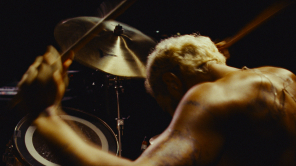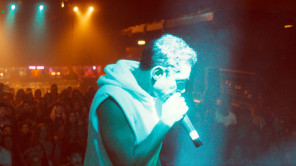In a year that has stymied many of his peers, Riz Ahmed has been incredibly prolific, with two 2020 feature releases—Darius Marder’s Sound of Metal and Bassam Tariq’s Mogul Mowgli—as well as an album, The Long Goodbye, which came with a powerful short imagining life in a racist, post-Brexit Britain. If The Long Goodbye is a showcase for the sometime musician’s eloquent wordplay, the two movies offer some of his finest acting work yet, as a heavy metal drummer coming to terms with his sudden deafness in Sound of Metal and as a rapper struck down by an autoimmune disease in Mogul Mowgli.
DEADLINE: Your recent choices turned out to be quite prescient this year: both Sound of Metal and Mogul Mowgli feature characters whose lives change when they are forced to face their mortality.
Related Story
Gotham Awards Full Winners List: ‘Nomadland’, ‘The Forty-Year-Old Version’, ‘I May Destroy You’, Riz Ahmed, Nicole Beharie Among Honorees
Amazon Studios
RIZ AHMED: Well, the ideas I’ve been really interested in recently, and I guess the ones I’ve been grappling with throughout my whole career—my whole life, really—are the ideas about how art and identity interact. So out of choice and out of circumstance, it has been just an area that I’ve either been interested in or been forced to be interested in, or to try and engage in. And I guess nothing really poses the question about the role of art, or the limitations and possibilities of identity, like mortality does. Our identities are made, and often we make art as an attempt to immortalize those identities, and I guess there’s something just so kind of humbling about living with death by your side, right? Because it can take these lofty illusions of artistic endeavor or personal identity and just dash them. The shadow of mortality is something that just throws both of those concepts into sharper relief.
DEADLINE: What appealed to you about Sound of Metal? It’s a very challenging, physical role, not just in terms of playing the drums, but in terms of sign language too.
AHMED: It was just a brilliant script. It’s pretty straightforward, really. My agents sent it to me. I loved the script, met Darius, loved him, and he told me this whole idea of learning the drums and learning sign language. I loved the idea of that. Of course, when I started down the road, there was some stuff to not love, alongside all the stuff to love.
It was a big challenge. It was quite grueling in many ways, but, by the end of the process, I’m able to look back and say, “It was just a tremendous gift.” Learning the drums, learning sign language—it just opened me up in different ways as a person, as an actor. It expanded and it enriched me, particularly being able to be immersed in some way in deaf culture, building those relationships. I often say that Jeremy Stone, my sign instructor, taught me the meaning of listening, taught me the meaning of communication. Listening isn’t something you just do in your ears. It’s something you do with your whole body, your attention, your energy. Communication, when you’re not hiding behind words, can often be more connected. I found myself getting much more emotional communicating in ASL at times than I did speaking about things. Jeremy warned me of this—he said that deaf people think of hearing people as emotionally repressed, because they hide behind words.
DEADLINE: How long did you train for it?
AHMED: It was seven or eight months, from February until September [2018], I think.
DEADLINE: Were you doing other things at that time? How did you fit that in with your work schedule?

Amazon Studios
AHMED: I moved to New York and just told myself, “This is what I’m going to do.” I’d drum for two and-a-half hours a day, sign for a couple of hours a day, and work on the script with Darius. It was one of those projects where you’re like, “All right, this is all in.” You can’t really dial this in. And not just because of the technical aspects, but also because Darius’s writing always has a way of plumbing such emotional depth. You see that in The Place Beyond the Pines. You see that in Blue Valentine as well. He’s baring his soul, opening a bit of a vein. So, you have to meet his words with that energy.
DEADLINE: Did you go straight from that to Mogul Mowgli?
AHMED: No. Actually, the one other thing that I was doing while I was in New York is that I was intermittently meeting up with Bassam [Tariq], and we’d talk about it. Like, what is this film? What are we going to do? It wasn’t really fully clear to us, even though we had a script. When I wrapped on Sound of Metal at the end of October, I went back to London, collapsed for a bit, and then we flew out to Pakistan, because we were going to make the film partly in Pakistan. We went there, met some people, filmed some interesting stuff, and when we came back, I was like, “Actually, I don’t think this is right. That’s not what this film is.” That was February. So, we just banged out a new script at the end of February and shot the film in April. The whole thing was similar in a way [to Sound of Metal], in that it was a very long period of gestation with a very concentrated burst of crystalizing the idea and then executing it.
DEADLINE: Was it a very demanding experience?
AHMED: With both projects, there was a lot of emotional stuff to mine. That’s true of any project, but what was interesting about Mogul Mowgli was the weight loss. You may or may not notice it, but basically, I’m playing a guy who is fit and healthy and ready to go on tour who is suddenly barely able to walk. We didn’t make a big thing of it and show lots of closeups of my ribcage, although you do start making out some of the weight loss, I think, towards the end, when my character argues with his family. I lost 10 kilos in three weeks for that film.

Pulse Films/Charades
That was part of the big challenge there, and it was really intense. I read about other actors going on that journey, and, obviously, it’s an emotional journey to go on with that kind of weight loss, but I didn’t realize that other people do it in five months with nutritionists and stuff. It was an almost micro-budget film—we were like, “F— it, let’s just do it.” I don’t think I’d attempt that again. I wouldn’t advise anyone to attempt that. Because it does take you emotionally to some really dark places. It’s crazy, actually. It just makes you realize how much we live in our bodies. If you deprive your body of nutrition, to a certain extent, your mind goes to some absolutely bat-s–t crazy places.
DEADLINE: How do you balance indie movies with franchise movies? Why do they interest you?
AHMED: The way I think about is, does it stretch me, and does it stretch culture in some way? Is it trying, in some way, to contribute to stretching the boundaries of genre, or people’s expectations of it, and rearranging their mental furniture? That’s one side. And then the other side is, will I learn and grow from it? And going from doing films like Shifty, to stuff like Rogue One, you absolutely learn. You learn about different kinds of filmmaking. You learn about how to do a marathon rather than a sprint. You learn all kinds of things.
DEADLINE: Do you keep the door open for those bigger projects? Could you return to the Star Wars universe?
AHMED: I haven’t had any conversations with anyone about it directly, but… I try and keep the door open to everything. I think part of the terror and the joy of life as an actor is you have to surrender a little bit to the waves. And you never know which direction they’re going to take you. I try and leave the door open to everything.
DEADLINE: You also released an album and a short film this year, The Long Goodbye. What would you like to say about that project?
AHMED: The Long Goodbye was directed by Aneil Karia who’s one of our brightest new talents, I think, in Britain as a filmmaker. Mogul Mowgli allowed me to put all my toys in one box, take the music—both rap music and Qawwali music— my British and Pakistani heritage, my Urdu and English, and put it into a film. I’m interested in that idea. I’m interested in hybridity as a person, but also now more and more as a performer. And that’s what The Long Goodbye was about. It was a chance to take the spoken word, rap, film, some of my, I guess, more social political opinions, but also personal feelings and put them all in one place.






